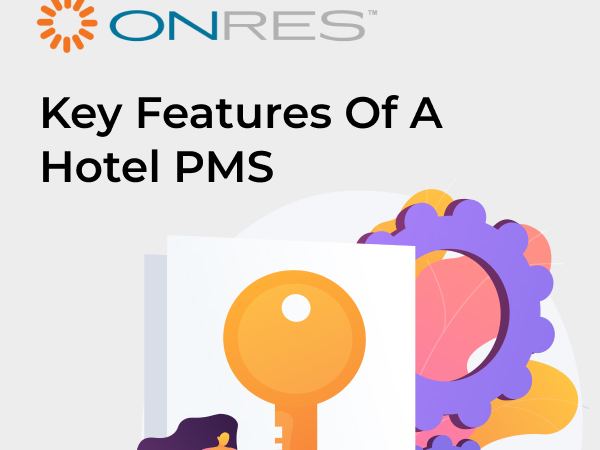Managing a hotel is no easy feat, with a multitude of tasks to oversee, from reservations to front desk operations, inventory management, and more. This is where a hotel property management system (PMS) comes in.
A PMS is a software solution that streamlines hotel operations, automates various processes, and enhances overall efficiency. It serves as a central hub that enables hoteliers to manage all aspects of their business from one location.
However, not all PMS systems are created equal, and there are several features that every hotel software provider should have to ensure efficient hotel management.
Table of Contents
In this blog, we will delve into the key features of a hotel PMS and why they are crucial for any hotelier looking to improve their operations and boost revenue.
Key Features of a Hotel PMS
Here are some features a hotel software must have.

1. Reservation Management
The reservation management feature of a hotel PMS allows hotels to manage room availability, rates, and reservations in real-time.
The PMS automatically updates room inventory, rates, and availability across all distribution channels, including the hotel website, online travel agencies, and global distribution systems (GDS).
This feature ensures that hotels never overbook rooms or sell rooms at incorrect rates, thereby avoiding costly errors that can negatively impact revenue and guest satisfaction.
2. Front Desk Management
The front desk management feature of a hotel PMS lets hotel staff manage guest check-ins, check-outs, and room assignments quickly and efficiently.
The PMS allows front desk staff to access all guest information, including guest preferences, past stays, and billing information, in one central location.
One of the key features of a hotel PMS, it streamlines the check-in and check-out process and reduces wait times, leading to higher guest satisfaction.
3. Housekeeping Management
The housekeeping management feature of a hotel PMS allows staff to manage room cleaning schedules and track the status of each room in real-time.
The PMS assigns rooms to housekeeping staff based on occupancy and guest requests, ensuring that rooms are cleaned promptly and efficiently.
This feature also allows staff to manage room amenities, such as towels and toiletries, and request maintenance services as needed.
4. Point of Sale (POS) Integration
A hotel software which has a POS integration feature allows users to manage all revenue-generating activities, including room service, restaurants, and gift shops, in one central location.
The PMS lets staff to track sales, inventory, and vendor payments, reducing errors and increasing revenue.
This feature also allows hotels to offer personalized guests experiences by integrating with loyalty programs and offering special promotions based on guest preferences.
5. Reporting and Analytics
Among the key features of a hotel PMS, this one lets hotels track key performance indicators (KPIs), such as occupancy rates, revenue per available room (RevPAR), and average daily rate (ADR), in real-time.
It also enables hoteliers to identify trends, optimize pricing and inventory, and forecast demand, ensuring that they can maximize revenue and profitability.
The PMS generates custom reports and dashboards that provide insights into hotel performance, allowing hoteliers to make data-driven decisions and optimize operations for maximum profitability.
6. Guest Relationship Management (CRM)
The guest relationship management feature of a cloud PMS allows hotels to manage guest profiles, preferences, and communication in one central location.
The PMS allows hotels to personalize guest experiences by offering special promotions and amenities based on guest preferences and past stays.
This among other key features of a hotel PMS also lets properties to communicate with guests via email, text message, or mobile app, providing timely and relevant information to enhance guest satisfaction.
7. Channel Management
This helps hotels to manage room inventory, rates, and availability across all distribution channels, including online travel agencies (OTAs), global distribution systems (GDS), and direct bookings.
The PMS ensures that room inventory is always up-to-date, rates are competitive, and availability is accurately reflected across all channels.
This feature also allows hotels to track revenue and bookings by channel, providing insights into which channels are most profitable.
8. Mobile Accessibility
Mobile access is a modern feature of a hotel PMS that allows hoteliers to manage their operations on-the-go.
It enables hoteliers to access their PMS platform via a mobile device, such as a smartphone or tablet, providing them with real-time access to their hotel operations.
It also allows hotel staff to manage guest requests, track housekeeping and maintenance services, and process payments, even when they are not at the front desk.
9. Integration with Third-Party Systems
This enables hoteliers to integrate their PMS platform with other software solutions, such as revenue management systems, accounting software, and marketing automation platforms.
Integration ensures that data is shared seamlessly between different systems, providing hoteliers with a unified view of their business operations.
It also enables hoteliers to automate tasks, reduce manual errors, and improve efficiency.
10. Security and Compliance
This feature protects the hotel’s reputation, ensures compliance with regulations, and builds trust with guests.
It ensures that guest data is stored securely and in compliance with industry standards and regulations, such as the General Data Protection Regulation (GDPR) and the Payment Card Industry Data Security Standard (PCI DSS).
OnRes has complied with all data security standards by integrating its solutions with PCI Booking.
The PMS also provides user access controls and activity logs, ensuring that sensitive information is accessed only by authorized personnel.
Frequently Asked Questions
Conclusion
A property management software for hotels is a powerful tool that enables them to streamline their operations and improve guest satisfaction.
These key features of a hotel PMS work together to provide hoteliers with a comprehensive platform that enables them to optimize operations and enhance the guest experience.
By adopting a PMS, hoteliers can manage their day-to-day activities more efficiently, increase revenue, and stay ahead of the competition.
Ultimately, the success of any hotel depends on the ability to meet and exceed guest expectations, and a hotel PMS is an invaluable tool that can help them achieve this goal.
